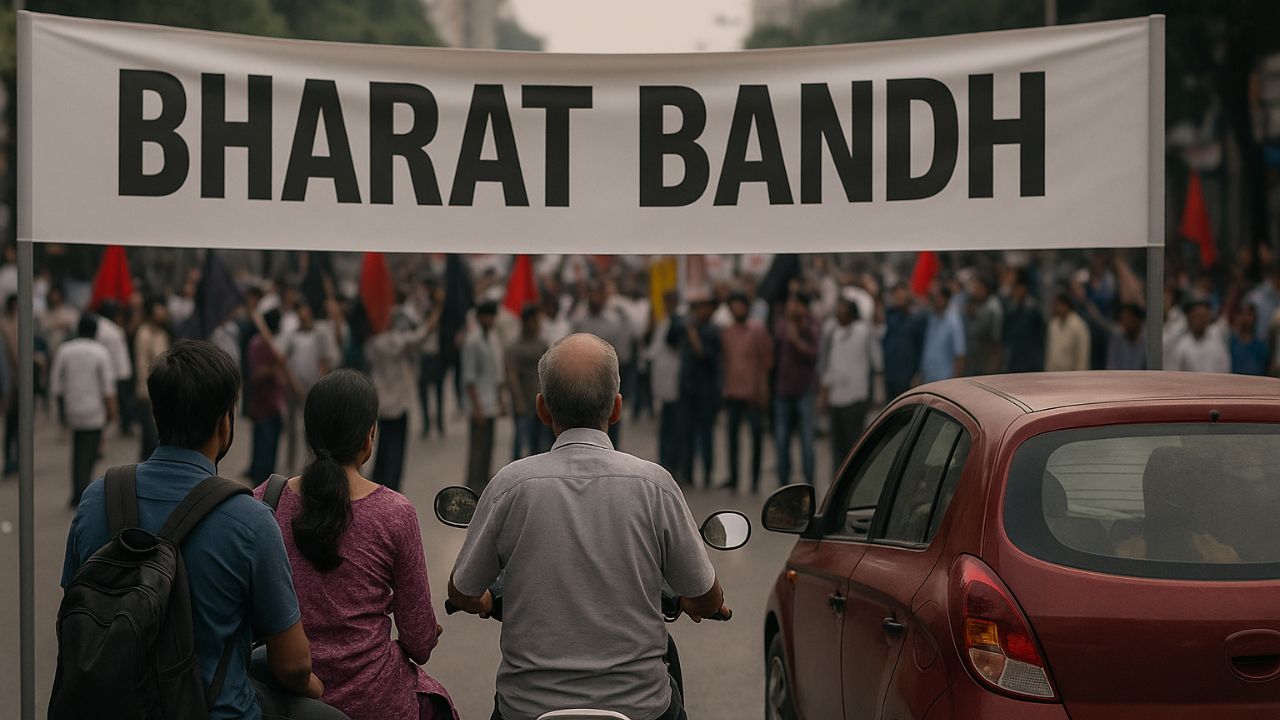Bharat Bandh on July 9: Over 25 Crore Workers to Strike in Protest Against Labour Reforms and Privatisation
Editor: Chandan M
Published on: July 8, 2025, 2:10 p.m.

A nationwide general strike, or Bharat Bandh, is scheduled for Wednesday, July 9, 2025, with participation expected from more than 25 crore workers across sectors. The strike has been called by a joint coalition of 10 central trade unions, including AITUC, INTUC, CITU, HMS, SEWA, and others. It marks one of the largest coordinated industrial actions in independent India’s recent labour history. The bandh is a protest against a series of government policies that the unions have described as anti-worker, anti-farmer, and excessively pro-corporate. The movement has also gained strong support from farmer and rural labour organizations under the Samyukta Kisan Morcha, thereby expanding the strike’s impact across both urban and rural India. At the center of this protest is a 17-point charter of demands, which was formally submitted to Union Labour Minister Mansukh Mandaviya in 2024. According to the unions, the government has not taken any meaningful action to address the demands. Who Is Demanding This? The charter has been issued by a joint platform of 10 central trade unions, including: AITUC (All India Trade Union Congress) INTUC (Indian National Trade Union Congress) CITU (Centre of Indian Trade Unions) HMS (Hind Mazdoor Sabha) SEWA (Self Employed Women's Association) AIUTUC, TUCC, AICCTU, LPF, and UTUC These unions are backed by farmers' and rural labour groups under the Samyukta Kisan Morcha. The 17-Point Charter of Demands The following are the key demands made by the trade unions: Reconvene the Indian Labour Conference, which has not been held for over a decade. Roll back or amend the four new labour codes, which unions say weaken collective bargaining rights, extend working hours, and protect employers from accountability. Protect the right to unionize and strike by restoring protections under labour law. Reject the dilution of labour protections under the pretext of ‘ease of doing business’. Stop the privatisation of public sector undertakings, including coal, steel, and railways. End outsourcing, contractualisation, and casualisation of permanent jobs. Fill all sanctioned vacancies in public sector entities such as Indian Railways, NMDC, and public education. Expand employment generation, especially via MGNREGA and urban employment schemes. Ensure fair compensation, including a national minimum wage, increased MGNREGA wages, and a minimum pension of ₹9,000 under EPF. Oppose exploitative hiring practices, such as re-engaging retired staff at reduced pay instead of hiring fresh workers. Withdraw pension reforms such as the Unified Pension Scheme, seen as regressive compared to the old pension system. Increase investment in welfare sectors such as health, education, housing, and sanitation. Hold employers accountable for labour law violations, including criminal penalties. Reject Employment Linked Incentive (ELI) schemes, which unions say benefit corporations more than workers. Stop the misuse of EPFO funds for subsidies to employers. Protect migrant workers from disenfranchisement and social exclusion. Preserve the democratic right to protest, resisting laws that criminalise peaceful dissent. Sectors Likely to be Affected Banking and Insurance: Public sector and cooperative banks will be impacted, leading to disruption in branch operations, cheque clearance, and customer service. Postal Services: Most post offices will remain closed, delaying mail and package deliveries. Public Sector Industries: Major disruptions are expected in coal, steel, transport, and other government-run units. State-Run Transport: Government bus services in multiple states are likely to be suspended or significantly reduced. Services Expected to Function Railways: Most railway services will operate normally, although localised disruptions could occur due to protest activity around stations or routes. Emergency Services: Medical, police, and fire services will remain operational and are exempt from the strike. Private Sector and Education: Schools, colleges, private banks, shops, and offices are expected to remain open, but may see lower attendance or accessibility issues due to transportation disruptions. Centre’s Position Union Labour Minister Bandaru Dattatreya has publicly urged trade unions to call off the nationwide strike, stating that the bandh is expected to cause minimal disruption and that essential public services, including healthcare and transportation, will remain functional. The minister reiterated that the government is open to dialogue with the unions and prefers consultation over confrontation. In his statement, the minister said, “Talks with trade unions will continue,” indicating that the Centre is not closing the door on negotiations regarding the 17-point charter of demands submitted by the unions in 2024. State-Level Responses In West Bengal, the state government has taken proactive steps to ensure that essential services remain uninterrupted on the day of the bandh. The administration has reportedly mobilized resources and security personnel to prevent public inconvenience and keep government operations running. Meanwhile, in Puducherry, the INDIA Bloc and supporting labour groups have endorsed the bandh. The local administration has announced a planned transport shutdown from 6 a.m. to 6 p.m., affecting bus and auto services across the Union Territory. Official Message The overarching message from both central and state governments aligned with the Centre is clear: citizens should not suffer due to the strike. Ministries and state departments have issued internal advisories encouraging continuity of services in banking, health, utilities, and public transport. The government has called upon union leaders to avoid inconvenience to the public and continue negotiations through established institutional mechanisms. What This Means for the Public While the central government has taken a calm and consultative stance, its influence on the scale of disruption will depend on how effectively state governments enforce service continuity. In states like West Bengal and Puducherry, where support for the bandh is stronger, localized disruptions in transport and public services may still occur. Citizens are advised to plan essential errands in advance, particularly those involving transport, banks, and postal services. While the Centre is focused on maintaining stability, the final impact will vary by region.